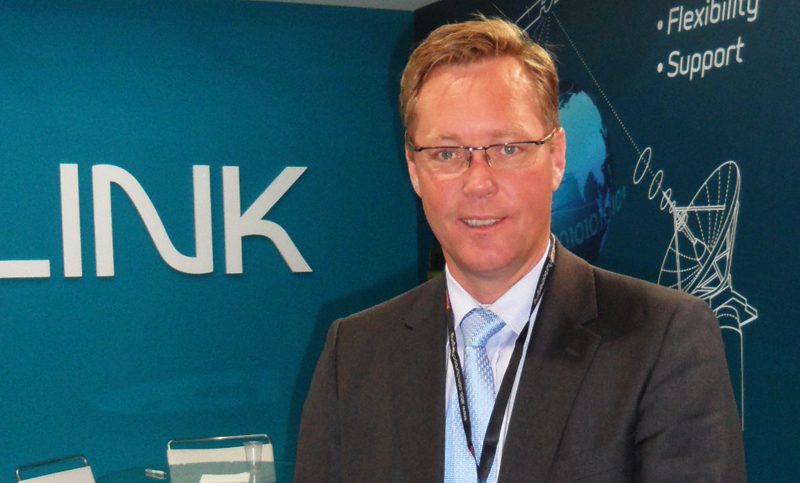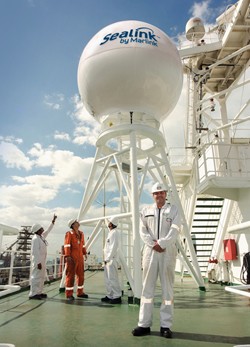Was The World’s ‘Northern-Most Island’ Erased From Charts?
by Kevin Hamilton (University of Hawaii) In 2021, an expedition off the icy northern Greenland coast spotted what appeared to be a previously uncharted island. It was small and gravelly,...


I imagine I’m not in the minority here when I say that the world of satellite communications is a bit confusing. When Marlink invited me to interview their CEO at this year’s Posidonia Expo in Athens, I agreed to it, but deep down I thought to myself, “I am completely retarded when it comes to the world of satellite communications, what the heck am I going to talk to him about?”


Thankfully Marlink’s Marketing Manager, Kate Hitchings was there to straighten me out before the interview, she explains:
There are two main types of marine satellite services, you have MSS and VSAT. MSS stands for Mobile Satellite Services, and VSAT stands for Very Small Aperture Terminal. The difference, if you think of it in terms of mobile phone contracts, MSS is pay as you go, smaller equipment, smaller domes. Inmarsat and Iridium both offer MSS. VSAT uses a larger dome, requires a bit more significant commitment when it comes to installation, but it’s like having a mobile phone contract where you pay a fixed monthly contract for unlimited use.
WaveCall, WaveCall Premium, and Sealink are Marlink’s VSAT services, while Inmarsat and Iridium cover our MSS services.
Depending on your coverage area, bandwidth, and services such as content filtering and prepaid cards, there is an applicable service you can choose. We can also offer bundles depending on how you operate so that you can switch between MSS and VSAT in case your ship falls out of a coverage area.
Who supplies the VSAT antenna?
We use Sea Tel, which is made by Cobham, Thrane and Thrane, and Intellian.
Did Thrane and Thrane just merge with someone?
They were just bought by Cobham.
Which system offers the best coverage? MSS or VSAT?
VSAT, Iridium and Inmarsat offer global coverage, and Iridium is what we call completely global because it includes the polar regions, which no other services does.
The Ku Band, is that VSAT?
Yes
And MSS? Which band is that on?
L band.
Thanks Kate.
No problem, let me introduce you to our CEO Tore Morten Olsen and Director of Marketing and Communications, Knut Natvig.


Good to meet you both, tell me a little bit about what’s going on at Marlink right now, how has your company evolved over the past couple years and where do you see it heading?
TO: Nice growth despite the downturn in the shipping market. The comms is increasing. So far this year, we have added around 80 FleetBroadband solutions, and around 25 VSAT solutions every month.
What is FleetBroadband? I’ve heard that a lot, but never really knew what it meant. Is that MSS?
TO: Yes. FleetBroadband is one of our offerings within the Inmarsat family of MSS communications products. They are basically the top notch product within the MSS arena.
KN: What is unique amongst MSS products is that they are more or less a commodity, the antenna is ready to go on board the vessel, ship owners can do it themselves, and you have the phone set on the modem so that you can start communicating as soon as you activate the simcard.
A giant cell phone, essentially.
TO: Where people start to get confused is when we start talking about all the other VSAT solutions. We have Sealink and WaveCall, whereas Inmarsat has something called Global Xpress.
But you all work with Inmarsat? So are you saying they have their own semi-competing version of VSAT?
TO: We have a cooperative agreement with them where we are their largest distribution partner for MSS services worldwide with about 16 percent of the global market, then we are one of their competitors within VSAT. Inmarsat acquired one of our VSAT competitors last year called Ship Equip which then became one of our core competitors. So, our relationship with Inmarsat is now very competitive, while at the same time very cooperative.
What is happening now over the next two to three years is Inmarsat is launching a new fleet of satellites called Global Xpress which will move into Ka band which is a higher frequency range providing greater throughput than what we’re seeing now. As of yesterday, Washington, DC-based Intelsat launched next generation satellites on Ku band. So we’re starting to see greater choice of satellite solutions coming forward to serve the market 2 to 3 years from now.
Is your company going to have access to those satellites?
TO: Yes.
All of them?
TO: Yes. That’s what we’re all about. We’re big enough globally to play will all the satellite operators. As I mentioned, we’re Inmarsat’s biggest customer on MSS, while where Intelsat’s biggest customer on Ku-band VSAT for maritime. So instead of assuming ship owners will know what the best solution is for their companies, we are working with the satellite operators to make sure they are developing products that are suitable for the maritime market, and then integrating them and providing this service to the ship owner.
So why would someone choose Marlink over Inmarsat?
TO: Because providers with one solution only will only recommend you to buy their solution. Marlink will recommend you the solution that is best for you, whether it’s Inmarsat-based, Iridium-based, or Intelsat-based.
KN: Another difference between MSS and VSAT is that they are both set up with the same kind of network where you have an antenna on the vessel, a satellite in space, and a land-earth station that provides a terminal for all the traffic. You have the same set up for both MSS and VSAT, but the difference is, like I said, an off-the-shelf commodity for MSS. That’s because Inmarsat owns the satellites, owns the land-earth stations, and basically by activating the simcard, you get access to the network. On VSAT, they only thing we buy is the capacity on the satellites. The rest we set up ourselves.
We set up the premade antenna, whether it be from Thrane and Thrane, Intellian, or Sea Tel, then connect the vessel via the space capacity we have bought from providers like Intelsat, then it is terminated at our teleports and then distributed onshore.
By teleports, I assume you mean land-earth stations?
KN: Yes.
Where are these land-earth stations located?
TO: We have three land-earth stations that we use for our global Ku network, one is located in Eik, Norway, the other is in Southbury, Connecticut, and also in Santa Paula, California. With those three we get global coverage, but then there are satellite operators that have specifically good coverage for the Indian Ocean for example, and we cooperate with several teleport operators, among others located in Australia in Hong Kong.
By that we control the technology and are more able to set up the best solutions for ship operators.
Do you have enough coverage right now to cover the needs of the shipping industry?
TO: We have enough infrastructure, but what we’re looking to do is to buy more satellite capacity, and maybe also on satellites that are more optimized for the maritime industry.
What percentage of ships out there have VSAT?
TO: VSAT is present on less than 10 percent of the ships, so there is huge growth potential. Inmarsat is on board 100 percent of vessels because you have to have a GMDSS safety system on board. FleetBroadband has captured a significant marketshare and is present on roughly 20 percent of maritime vessels.
You can view the mariners who are graduating from maritime schools these days will not accept working for months while being disconnected. There’s one thing for sure, growth will happen, but whether it’s via volume only or also in revenue is yet to be determined.
Are there any other products that you can offer companies, besides satellite connectivity, that can be an added benefit?
TO: There are two categories of products, one is the group of products tailored toward crew such as crew usage cards, the other is toward operational efficiency. Marlink, being acquired by Astrium last year, we are working hard to find applications such as anti-piracy where we can use geo-observation satellites to monitor and track piracy and track pirated ships. Another is iceberg monitoring as the Northwest Passage and Northern Sea Route become more attractive. The third is around oil spill and pollution where it can alert ships that are entering oil spill areas so as to avoid expensive cleaning bills.
We are looking at ways of mixing Astrium’s observation capabilities with our communications capabilities, so a lot more fun to come!
One of the interesting things is the usage of Facebook at sea, it’s amazing the way mariners are using that. One time we sent out a piracy alert via Facebook and a guy immediately commented saying he had just entered the area and thanked us for the heads up. All in real time of course.
KN: If you go back three years, shipowners were looking to limit usage of those websites, things that they considered were not really useful. Banking and voice calls were the usual traffic, but now it’s quite the opposite. If you don’t allow Facebook, people won’t want to work with you.
Are you on Facebook?
TO: [Laughing] Yes, of course.
KN: I’m on Facebook, yes.
What about access to packaged news at sea? Obviously gCaptain’s news is free, but is there any discussion along those lines?
TO: We have applications called Infotainment which is a combination of news, sports, but also educational programs so that you can continue your certifications while at sea. The difficulty is the ownership of the content, such as sports, so it needs to be tailored to the specific crew.
KN: I think it’s important to note that even though we are definitely moving in the direction of higher throughput and higher speed on data, there is still going to be a lot of ship owners out there who won’t spend more than $300 to $500 per month, they have extremely restricted communications policies. That’s going to remain as we head into the future.
Are you currently looking at other emerging opportunities as the satellite communications sector grows?
TO: Some of the more long term, innovative things we’re looking at is to work with engine manufacturers to enable remote engines monitoring from shore. Another possibility is with insurance companies and providing advanced telemedicine capabilities on board which would they would either pay for, or rates would be reduced to the ship owner.
Join the gCaptain Club for curated content, insider opinions, and vibrant community discussions.


Join the 105,968 members that receive our newsletter.
Have a news tip? Let us know.
Access exclusive insights, engage in vibrant discussions, and gain perspectives from our CEO.
Sign Up




Maritime and offshore news trusted by our 105,968 members delivered daily straight to your inbox.



Essential news coupled with the finest maritime content sourced from across the globe.
Sign Up